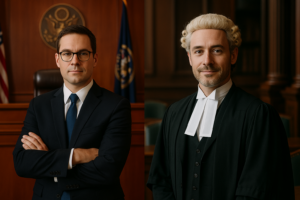The legal profession is facing a significant but under-addressed crisis: the high prevalence of alcohol abuse among practicing attorneys. This article examines the incidence of alcohol use disorder (AUD) in the legal field, its impact on attorney competence and job performance, and its relationship to the rising rates of anxiety and depression among lawyers. Drawing upon empirical studies, psychological theories, and clinical data, we argue that alcohol, far from being a coping mechanism, intensifies the already considerable environmental stressors lawyers face. Finally, we propose practical solutions—adaptations of the 12-Step model of Alcoholics Anonymous (AA)—designed specifically to meet the demanding schedules and psychological profiles of attorneys. These tailored interventions offer a pathway toward sobriety, emotional resilience, and professional effectiveness.
Introduction
The legal profession has long been romanticized as the domain of elite intellects and tireless advocates. Yet behind the stoic image lies a growing crisis of mental health and substance abuse, with alcohol at the center. For many attorneys, alcohol use begins as a tool for stress relief and social bonding but quickly devolves into a maladaptive coping strategy that compromises professional judgment, impairs cognitive functioning, and undermines ethical obligations.
Incidence and Scope of Alcohol Abuse in the Legal Profession
A landmark study published in the Journal of Addiction Medicine (Krill, Johnson & Albert, 2016) surveyed 12,825 licensed, employed attorneys and found that 21% of respondents qualified as problem drinkers, a rate significantly higher than in most other professions. Among attorneys under the age of 30, this figure surged to nearly 32%, indicating a troubling generational trend. These statistics suggest that alcohol abuse is not a fringe concern but a systemic issue.
Additionally, the American Bar Association (ABA) Commission on Lawyer Assistance Programs has highlighted how alcohol misuse begins early—often in law school—where competitive pressures, identity formation around success, and minimal institutional support create fertile ground for dependency.
Alcohol Abuse and Its Impact on Competence and Job Performance
Attorney competence is foundational to the legal profession, codified in Model Rule 1.1 of the ABA’s Model Rules of Professional Conduct, which requires attorneys to provide competent representation. Yet alcohol abuse erodes the pillars of competence—cognitive clarity, emotional regulation, and ethical decision-making.
Research in The American Journal of Psychiatry (Sullivan et al., 2005) has demonstrated that alcohol impairs the prefrontal cortex, the region responsible for decision-making and impulse control. Among attorneys, this cognitive compromise can result in missed deadlines, poor client communication, and increased malpractice risk.
A 2020 survey by the Institute for Well-Being in Law found that attorneys who met criteria for problematic drinking also reported higher rates of professional misconduct, including lying to clients, disobeying court orders, and engaging in adversarial hostility. In other words, alcohol abuse directly threatens both legal ethics and workplace efficacy.
The Alcohol-Anxiety-Depression Triad
Numerous studies have explored the bidirectional relationship between alcohol abuse and mental health disorders. The National Epidemiologic Survey on Alcohol and Related Conditions (NESARC) found that individuals with AUD are two to three times more likely to suffer from major depressive disorder (MDD) or generalized anxiety disorder (GAD).
The self-medication hypothesis, originally articulated by Khantzian (1985), posits that individuals often use substances like alcohol to dull psychological pain. In the case of attorneys—who experience high rates of secondary trauma, adversarial stress, and identity fusion with their work—the turn to alcohol can seem like a temporary reprieve. Yet, neurobiological studies have shown that chronic alcohol use worsens emotional regulation, intensifies ruminative thinking, and disrupts serotonin balance, thereby worsening depression and anxiety over time.
Alcohol as a Maladaptive Response to the Legal Environment
Legal practice is inherently stressful. Attorneys are expected to perform under relentless deadlines, navigate ambiguous ethical terrain, and absorb the emotional burdens of their clients—all within a win-lose adversarial framework. The resulting emotional dissonance, often referred to as “moral injury,” can drive attorneys to seek relief in maladaptive behaviors.
Alcohol may offer transient relief, but it undermines the very tools attorneys need to thrive—resilience, focus, empathy, and integrity. Rather than buffering stress, alcohol erodes the baseline of psychological stability, amplifying the very pressures it purports to numb.
Mitigation Strategies: Adapting the 12 Steps for the Legal Profession
The 12 Steps of Alcoholics Anonymous have long been a cornerstone in recovery programs. However, for attorneys with grueling schedules, high-functioning denial, and a tendency toward intellectualization, the traditional format may seem inaccessible or even irrelevant. Below are proposed adaptations of key AA principles for attorneys:
Step 1 – Acknowledging Powerlessness with Precision: Attorneys might reframe “powerlessness” as a recognition that their strategies (control, logic, denial) are no longer serving them. This framing respects their intellect while inviting transformation.
Step 3 – Reclaiming Autonomy Through Surrender: Rather than a theological surrender, attorneys may benefit from yielding to a values-based process—surrendering to a program of structure, accountability, and peer support.
Step 4 – Cognitive Inventory: This step can be translated into a structured cognitive behavioral exercise, where attorneys identify core beliefs, emotional triggers, and the patterns underlying their drinking.
Step 5 – Therapeutic Disclosure: Attorneys may initially prefer to share their inventories with a therapist rather than a sponsor. Confidentiality and professional boundaries are paramount in legal culture.
Step 10 – Daily Monitoring via Journaling or Apps: Rather than verbal check-ins, a busy attorney might utilize brief end-of-day reflection exercises or digital logs to monitor emotional states and cravings.
Step 12 – Professional Service: Attorneys in recovery might be encouraged to support colleagues or engage in pro bono work for clients battling substance abuse, thus integrating their recovery into their professional identity.
In addition, confidential attorney-only AA groups, such as “Lawyers Helping Lawyers,” offer specialized peer support. Online meetings, weekend intensives, and asynchronous forums can also accommodate demanding schedules.
Conclusion
Alcohol abuse within the legal profession is not merely a personal failing—it is a systemic hazard that threatens attorney well-being, client representation, and the integrity of the justice system. Given the profession’s high-pressure environment and psychological demands, attorneys are uniquely vulnerable to the insidious allure of alcohol. Yet, with targeted interventions, adapted recovery frameworks, and cultural shifts toward vulnerability and support, the legal field can evolve.
As the guardians of justice, attorneys owe it to themselves and to society to pursue not just competence, but wholeness—and that begins with addressing the bottle in the room.
References:
Krill, P. R., Johnson, R., & Albert, L. (2016). The Prevalence of Substance Use and Other Mental Health Concerns Among American Attorneys. Journal of Addiction Medicine, 10(1), 46-52.
Sullivan, E. V., et al. (2005). Neurocognitive consequences of alcoholism. Neuropsychology Review, 15(3), 227–244.
Hasin, D. S., et al. (2007). Prevalence, correlates, disability, and comorbidity of DSM-IV alcohol abuse and dependence in the United States. Archives of General Psychiatry, 64(7), 830–842.
Khantzian, E. J. (1985). The self-medication hypothesis of addictive disorders. American Journal of Psychiatry, 142(11), 1259–1264.
American Bar Association (2022). Well-Being Toolkit for Lawyers and Legal Employers.









